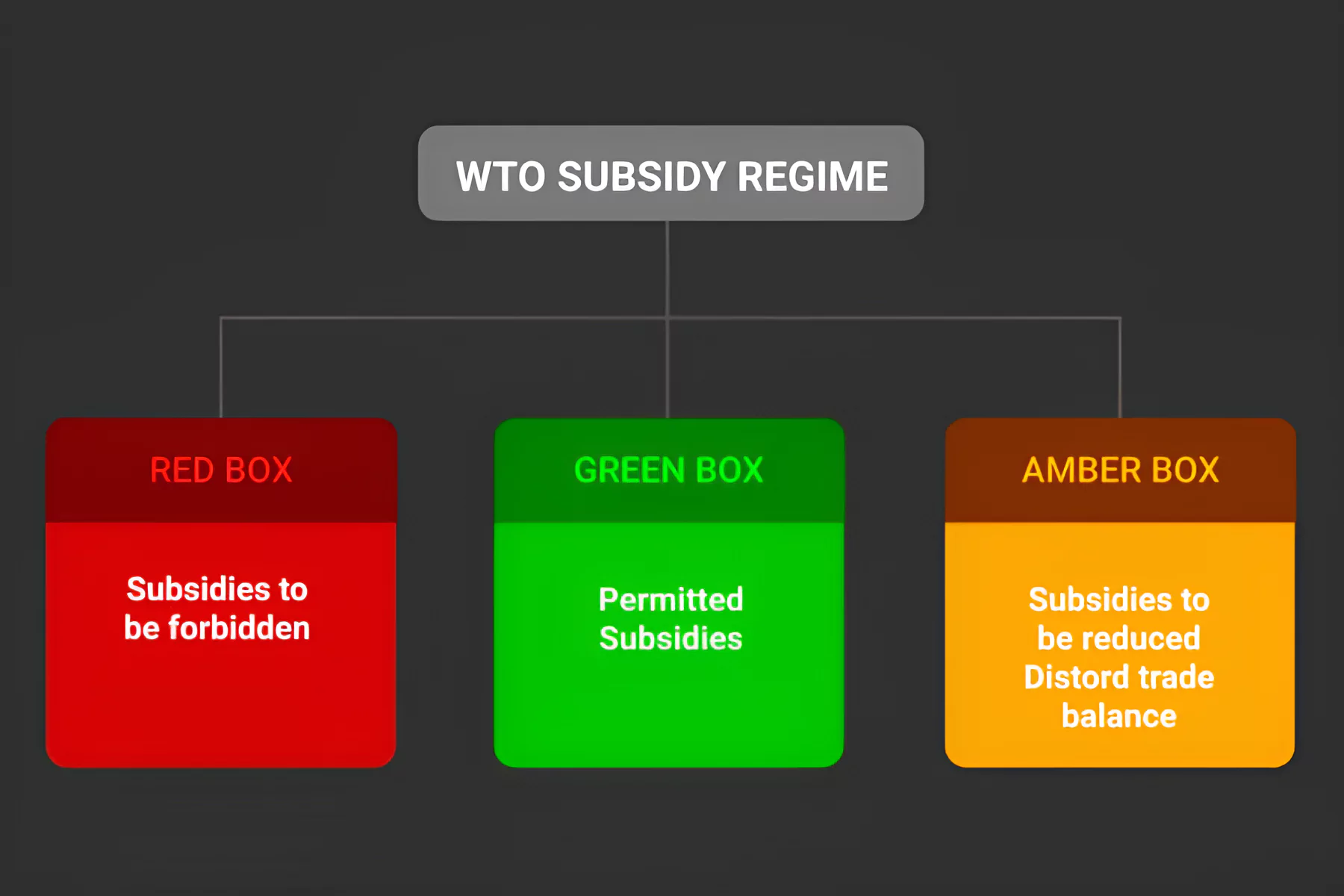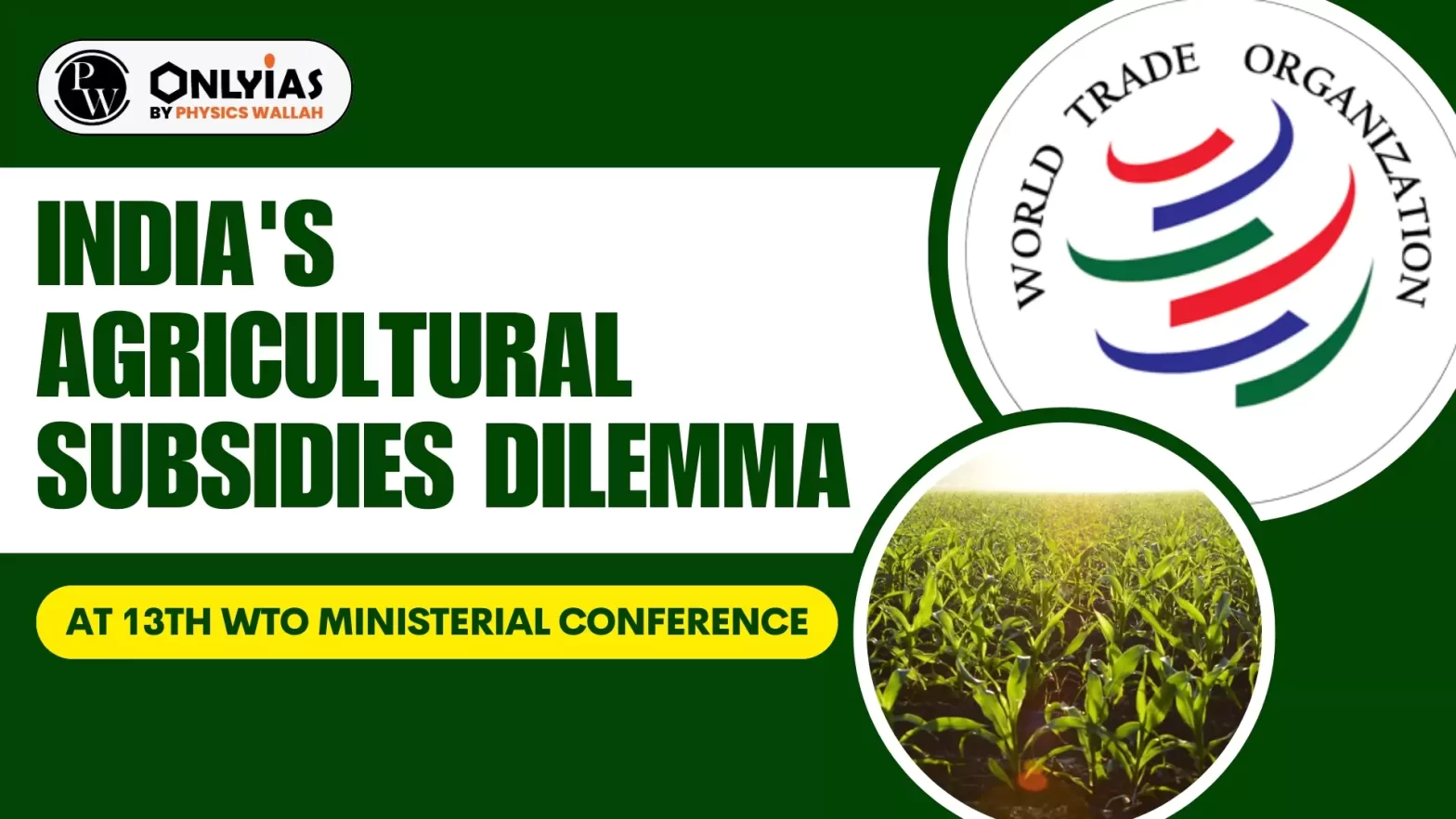Context:
This editorial is based on the news “Tepid trade-offs: On the 13th WTO Ministerial Conference (MC13) in Abu Dhabi” which was published in the Hindu. The latest 13th WTO Ministerial Conference (MC13) in Abu Dhabi concluded with little progress on key issues that affect global trade.
Contentious Issues on the13th WTO Ministerial Conference
-
Agricultural Subsidies in india:
- India’s Public Stock Holding (PSH) program is characterised as “highly subsidised,” and the country’s farm support is deemed to distort global food prices, adversely impacting the food security of other nations.
- As per WTO, nearly all domestic support measures are considered to distort such trade, but they are permitted to a certain limit called the ‘de minimis’ limit
-
Breach of De minimis:
- Under the provisions of the WTO’s Agreement on Agriculture (AoA), the aggregate value of the product-specific support should not exceed 5% of the total value of production of the agricultural product in question.
- In the case of developing countries such as India, the de minimis ceiling is 10%.
- India has breached the de minimis limit in the case of rice, with subsidies worth $6.31 billion or 13.7%.
 This has angered other exporters such as Thailand, as they are finding it difficult to compete with Indian rice and losing the global export market share to India.
This has angered other exporters such as Thailand, as they are finding it difficult to compete with Indian rice and losing the global export market share to India.
-
Issue of Overfishing:
- Due to subsidies given to the fisheries sector.
-
Abu Dhabi Declaration:
- It refers to the need to ensure open, inclusive and resilient supply chains, but there is little substance in this.
-
Custom Duty for E-commerce:
-
- The exemption from customs duties for e-commerce, that India had sought an end to, citing the adverse impact on countries’ revenues, will now carry on for at least two more years.
-
WTO’s Dispute Resolution Body:
-
Attack on the Peace Clause:
-
- The Cairns Group is also attacking the ‘peace clause’, triggered after India breached the de minimis limit.
Cairn Group
- Comprises: Argentina, Australia, Brazil, Canada, Chile, Colombia, Costa Rica, Guatemala, Indonesia, Malaysia, New Zealand, Pakistan, Paraguay, Peru, Philippines, South Africa, Thailand, Ukraine, Uruguay, and Vietnam.
- It has been lobbying for agricultural trade liberalisation.
- Trade experts say that the grouping is trying to get India to dismantle or reduce the scope of the Minimum Support Price (MSP) scheme.
- Through the scheme, the government gives an assured price to farmers for certain major crops to ensure price stability and secure farmers’ income.
- They argue that the MSP enables Indian rice to be exported at lower rates.
|
India’s Arguments and Demands at the WTO
- Difficulty in using Peace Clause: Burdensome conditions and numerous notification requirements hinders the practical application of the clause.
- India is seeking permanent resolution for Public Stock holding of food grains.
- Extent of Subsidy: India has been arguing that the subsidy that it provides is far less than what the US and EU give.
- For example, Indian government’s subsidy to farmer comes in at $300 per farmer, compared to $40,000 per farmer in USA.
| Success for India:
A key win for India at the MC13 was its successful efforts with South Africa to thwart an attempt to introduce an investment facilitation pact into the WTO framework. |
- Concern on Subsidies Calculation: India has raised concerns regarding the methodology used for calculating subsidies at the WTO.
- The current calculation relies on a fixed and outdated price range from 1986-88, resulting in an overestimation of subsidies.
Conclusion
India will have to redouble efforts to retain policy space for sensitive sectors, especially farms. The WTO itself must do much more to stay relevant in an increasingly polarised world.
Also Read: Red Sea Crisis
| Prelims PYQ (2020):
Consider the following statements:
1. In the case of all cereals, pulses and oil-seeds, the procurement at Minimum Support Price (MSP) is unlimited in any State/UT of India.
2. In the case of cereals and pulses, the MSP is fixed in any State/UT at a level to which the market price will never rise.
Which of the statements given above is/are correct?
(a) 1 only
(b) 2 only
(c) Both 1 and 2
(d) Neither 1 nor 2
Ans: (d) |
![]() 5 Mar 2024
5 Mar 2024

 This has angered other exporters such as Thailand, as they are finding it difficult to compete with Indian rice and losing the global export market share to India.
This has angered other exporters such as Thailand, as they are finding it difficult to compete with Indian rice and losing the global export market share to India.